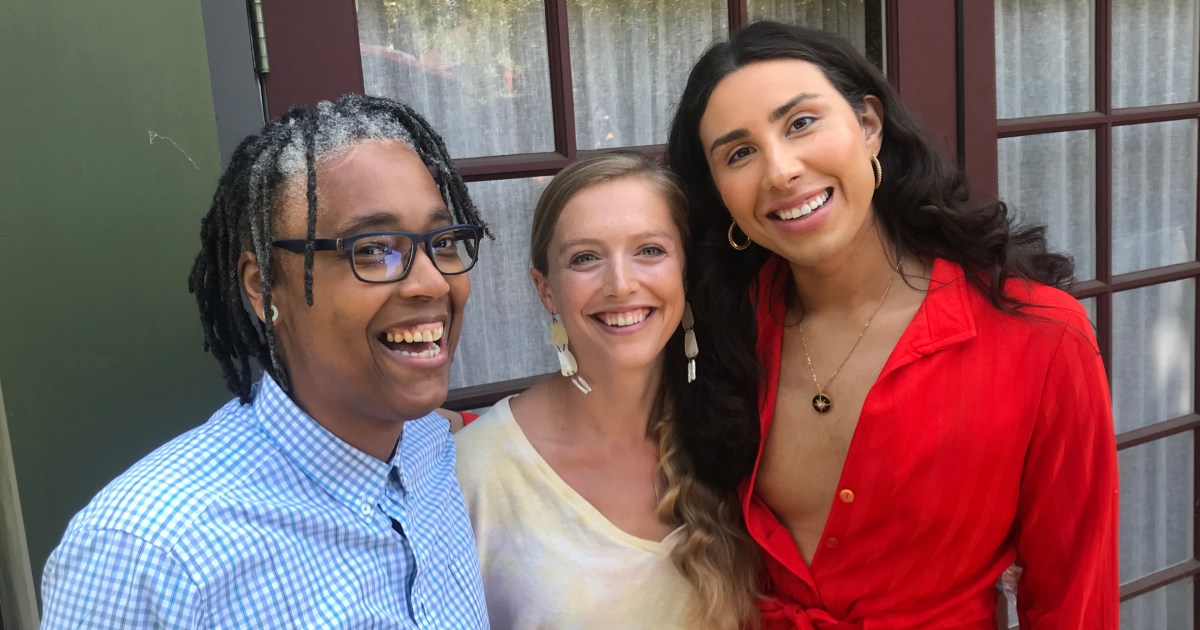
In “Every Body,” filmmaker Julie Cohen — who co-directed the 2018 Emmy-winning Ruth Bader Ginsburg documentary, “RBG” — follows three powerful voices in the intersex community, which is composed of individuals who have a combination of male and female biological traits, including chromosomes.
From the worlds of politics, public health and entertainment, these activists in their 30s and 40s use their life stories to bring attention to a community that, despite representing an estimated 1.7% of the global population, has been largely unrepresented in popular culture. And because of that, the documentary asserts, their lives have been dictated and weaponized by conservative forces in the medical community and, more recently, by politicians legislating transgender children’s rights.

“For a trans kid or a gay kid, they can’t tell you they’re gay or trans until they can vocalize those feelings. With an intersex kid, you often know from the moment they’re born, and so the effort to erase our existence starts from the minute we leave the birth canal — through surgeries, through doctors, through hormones, through language, through the very split-second decision of whether to put male or female on a birth certificate,” one of the three activists, Alicia Roth Weigel, told NBC News in a conversation with Cohen and fellow activists Sean Saifa Wall and River Gallo. “The first decision that is made in our lives is to actively erase our existence.”
Like her fellow documentary subjects, Weigel, a Texas-based political consultant and writer who uses both she/her and they/them pronouns, has been a vocal advocate for queer and trans rights throughout her career. But she has struggled with her own community being left out of conversations about bodily autonomy — and, more importantly, conversations at large. As Weigel says in an early scene in the film, “No one even knows what intersex means, and people fear what they don’t know and understand.”
“Every Body” addresses head-on the pervasive lack of understanding about what it means to be intersex, beginning with how modern medical practices, predicated on long-held beliefs about the gender binary, are at the root of it.
As the documentary explains, people who are born intersex are assigned either male or female at birth based on the recommendation of a health care provider. As part of this, they are subjected to surgeries, some of which are performed in infancy, that alter sex organs to mirror conventional ideas about males and females. And then, with the cooperation of their parents, they undergo treatment with hormones and in some cases additional procedures during their adolescence. All of this is typically done without the person knowing the truth about their condition.
 Director Julie Cohen on location as production films “Every Body.”Laura Nespola / Focus Features
Director Julie Cohen on location as production films “Every Body.”Laura Nespola / Focus Features
This standard of care, as the documentary reveals, was pioneered by the psychologist John Money, who emerged as an influential sex researcher and professor at John Hopkins in the mid-1960s. His name then became synonymous with the treatment of “hermaphrodites” because of one patient who, despite not being intersex, became the case study for Money’s approach to gender reassignment: David Reimer.
As explored in a 1999 NBC “Dateline” segment that inspired Cohen’s documentary, Reimer, who was assigned male at birth, was mutilated as an infant during a routine circumcision and then assigned female at the encouragement of Money. Although the case was touted as a success story by the psychologist and by scientific texts for decades, Reimer struggled with mental health issues related to his gender throughout his childhood and adolescence. And as a teenager, when he was finally told the truth, he underwent painful, gender-affirming surgeries and began living as a man. His life tragically ended in 2004, when he died by suicide at the age of 38.
It was this shocking story that grabbed the attention of Cohen, a former “Dateline” producer, when she was invited to look through the archives for “jumping-off points” for feature-length, theatrical documentaries. Focus Features, the film distributor behind “Every Body,” shares a parent company with NBC News: NBCUniversal.
“I gravitated pretty quickly toward the Dr. Money-David Reimer story — that historic, stranger-than-fiction story about a young boy who, because of his injury, was turned by doctors into and raised as a girl without his consent or even knowledge,” Cohen told NBC News.
Cohen said she then started to explore how Reimer’s story was relevant today.
“It didn’t really take much internet research to come to understand that there was this blossoming movement of people speaking up for intersex rights as human rights — of which the three people beside me are such stellar examples,” Cohen added, motioning to Weigel, Wall and Gallo.
The stars of the film, as Cohen calls them, all knew each other from years of working in intersex activism, a movement that has been alive for around 30 years, according to Wall, the most veteran activist in the group. But in many ways, their participation in “Every Body” will be their most visible acts for the movement yet, despite the fact that they have appeared at hearings, led marches, been guests on podcasts and spoken about the cause on social media.
“I actually view this as like the safest opportunity I’ve ever had being an intersex activist,” Weigel said. “On the ground in Texas knocking on doors for campaigns, having people recognize me from conversations with alt-right pundits, having had my face used in alt-right campaigns across the country — a lot of my life is putting myself in active danger for the movement.”
 Intersex activists Alicia Roth Weigel, River Gallo and Sean Saifa Wall.Focus Features
Intersex activists Alicia Roth Weigel, River Gallo and Sean Saifa Wall.Focus Features
Gallo, who uses they/them pronouns, is a New Jersey-born actor and screenwriter whose award-winning short film “Ponyboi” broke ground for intersex creators. Gallo said they embraced being in “Every Body” as a chance to connect with their mother and to talk about how growing up intersex had affected their family. In the documentary, Cohen captures Gallo and their mother watching home movies and flipping through photo albums, which spark conversations that underscore the difficult relationships intersex people can have with their parents.
“To have the opportunity to invite these wonderful creators to enter my home and to look at old footage — home videos of myself that I hadn’t even seen — it was like unearthing parts of myself that I didn’t even know I needed to face,” Gallo said.
Gallo, who said they viewed their intersex identity as “something monstrous” for most of their life, found participating in the film to be “really healing.”
Wall, a doctoral student and co-founder of the Intersex Justice Project, echoed Gallo’s sentiments about participating in the film.
“I will lend my voice and my experience to anywhere that pushes the ball up the hill. I’m grateful that Julie took a risk to document our stories in a very respectful, loving way, to really amplify this issue during this time,” Wall said in reference to an unprecedented moment in legislation targeting transgender people.
He added: “There’s been this very active erasure of intersex people, and what makes the legislation that’s happening now in the U.S. so dangerous is that, as the intersex movement is emerging, you have these anti-trans laws that are actively trying to silence and erase people once again.”
As the documentary details, the surgeries and therapies that are used, often nonconsensually, on intersex people beginning in infancy are the same ones being denied to transgender minors seeking gender-transition care. By the latest count, 20 states have passed laws limiting transition-related care for minors, according to the Movement Advancement Project, an LGBTQ think tank. And while these bans are beginning to be challenged in court — with the first case of one being overturned happening recently in Arkansas — the effects have reverberated throughout the trans community, as well as the intersex community.
As Weigel pointed out, there are clauses in these laws that carve out the ability to perform these surgeries on intersex people, codifying in law what has long been the position of the medical community.
“The bills that criminalize surgeries and hormones for trans children contain explicit language that allows those same surgeries and hormones to be forced on children who have not asked for them,” Weigel said. “It just shows that there’s no logic. There’s no science; there’s no reasoning. There’s nothing behind it beyond discrimination.”
As seen in “Every Body,” Weigel testified in front of a hearing about the 2017 Texas bathroom bill that was aimed at transgender people and supported by Gov. Greg Abbott. In front of the committee, Weigel argued that her intersex identity proved that bathroom use can’t be dictated on the basis of biology, especially as it’s understood in the limited framework of the gender binary. And while she’s eager to continue making that argument on behalf of the battle for LGBTQ rights, she wants to be sure that intersex people are being fought for as well — rather than being used as a “gotcha” to debunk lawmakers’ arguments.
“As communities’ rights advance, we have consistently seen that people like to pull the ladder up behind them. So, as soon as gay folks got the right to marry, then it was trans folks fighting for the stage,” Weigel said. “When one community gets their piece of the pie, they tend to wipe their hands clean, and we can’t do that, because what we’ve seen through all of this is how inextricably tied all of our rights actually are.”
“Every Body” opens in U.S. theaters June 30.





GIPHY App Key not set. Please check settings